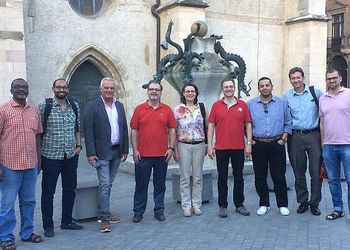
Workshoparchiv
Ein Workshop der Forschungsgruppe SoliKris
Der internationale Workshop Measuring European Solidarity hat zum Ziel, Solidarität innerhalb der Europäischen Union zu erforschen. Genauer gesagt besteht das Forschungsinteresse des Workshops in der Operationalisierung von Solidarität im europäischen Kontext. Entwickelte sich der Begriff Solidarität in den Jahren europaweiter Krisen zu einem Schlagwort in der Wissenschaft sowie im medialen Diskurs, fehlt es dennoch nach wie vor an geeigneten Messmodellen. Geplant ist es eine Zusammenkunft von WissenschaftlerInnen auf dem Gebiet europäischer Solidarität zu ermöglichen und dadurch den inner- und interdisziplinären Austausch zu stärken. Es sollen Zeit und Raum für Diskussionen und fachlichen Austausch geschaffen werden, mit dem Ziel, eine zukünftig stärker vernetzte Forschungsgemeinschaft hervorzubringen.
Programm
Workshopbericht der Projektgruppe SoliKris:
Unser Workshop „Measuring European Solidarity“, finanziert vom Leibniz-Forschungsverbund "Krisen einer globalisierten Welt", der bei GESIS in Köln Ende Januar stattfand, war ein voller Erfolg. Insgesamt gab es fünf thematische Blöcke, mit denen wir uns über die zwei Tage verteilt beschäftigt haben: Defining Solidarity in Europe, Experimental Designs, Analyzing Discourse, Empirical Conceptualizations of Solidarity und Solidarity on Specific Policies. Die Präsentationen der Teilnehmenden machten es möglich, sich mit unterschiedlichen Forschungsansätzen zum Thema auseinanderzusetzen und durch die Einblicke Anregungen für die eigene Arbeit zu bekommen. Die interessanten Diskussionen die darauf folgten wurden nicht nur während des Workshops, sondern auch in den Pausen und beim gemeinsamen Abendessen im kölschen Brauhaus weitergeführt. Für die Zukunft ist eine, aus dem Workshop hervorgehende, gemeinsame Publikation geplant, um die verschiedenen Ansätze in gebündelter Form für die Forschungsgemeinschaft zur Verfügung zu stellen.
Wir bedanken uns bei allen, die teilgenommen haben und zum Teil aus ganz Europa angereist sind und freuen uns auf einen weiterführenden Austausch!
Quelle: GESIS – Leibniz-Institut für Sozialwissenschaften, Mannheim. SoliKris – Veränderung durch Krisen? Solidarität und Entsolidarisierung in Deutschland und Europa. Veranstaltungen.
Beteiligte Institute
Leibniz-Institut für Sozialwissenschaften (GESIS)
Wissenschaftszentrum Berlin für Sozialforschung (WZB)
Ansprechpersonen
Die Folgen des globalen Umweltwandels für soziale und ökologische Systeme werden zunehmend sichtbar. Gleichzeitig beschreibt eine steigende Zahl an Akteuren diese Folgen als krisenhaft. Gesicherte Einsichten zu den sozialen Folgen von Umweltwandel sind allerdings nach wie vor begrenzt und die Fragen, ob und wann diese Folgen eine Krisen darstellen (und falls ja, welche Form von Krise) bleiben wissenschaftlich und politisch umstritten. Dieser Workshop zielte darauf ab, interdisziplinäre Expertise aus der Leibniz Gemeinschaft und darüber hinaus zu diesem hochaktuellen Thema zusammen zu bringen.
Der Workshop fand im August 2019 in Braunschweig statt.
Beteiligte Institute
Georg Eckert Institut für internationale Schulbuchforschung (GEI)
German Institute for Global and Area Studies (GIGA)

Participants in the Smartchain workshop in Halle (Saale) © IAMO Workshop on grain production in North Africa
In the scope of an international workshop at IAMO from 18 to 20 June 2019 on the subject “Innovations for increasing the income of smallholders and resilience in the wheat supply chain in North Africa” the opportunities for future co-operation between IAMO and research institutions in the North African region were investigated.
During the meeting with national representatives from Morocco, Egypt, Tunisia and Sudan problems and challenges of the agricultural sector were discussed, such as the environmental impact of cereal production. For example, the straw that remains after the harvest is often burned, with negative consequences for the climate. In addition, agricultural production in North African countries is highly inefficient. Fields are flooded with scarce water resources and the excessive use of fertilisers and pesticides leads to soil damage. Furthermore, it is essential that food production is increased to cover the needs of a fast-growing population, thus reducing migration from rural regions to the cities or the EU. In particular, the participants discussed the possibility of securing sustainable food production. The international workshop was financially supported by the Leibniz Research Alliance "Crises in a Globalized World".
Contact Persons
PD Dr. habil. Linde Götz (IAMO)
Dr. Osama Naser El-Din Ahmed (IAMO)
Source: IAMO Newsletter 3/2019, 4 November 2019, Leibniz Institute of Agricultural Development in Transition Economies.
Am 8.-9. November 2018 fand in Frankfurt der dritte Cultures of Crisis Workshop mit dem Titel "Professional Cultures of Crisis Management" statt. Die Veranstaltung beinhaltete eine Keynote von Arjen Boin, Professor of Public Institutions and Governance an der Universität Leiden.
The concept of crisis is elusive and it is highly disputed what actually makes a crisis a crisis. However, some elements reoccur more frequently than others when talking about crises. Among them are: “Decisive situation for better or worse”, “ambivalent combination of threat and opportunity”, “acting outside the routine”, “high degree of indeterminacy” and “acting under pressure”. What can be said is that such and similar understandings of crisis do travel far. Crises occur in different regional contexts and many cultures use the concept itself or a similar term. Yet, at the same time, crisis is no universal concept that is used by all humankind and at all times in the same way. It has evolved over time and some cultures adapt it more readily than others. It seems to be bound to particular cultural believes, such as: human agency exists, the future is open and can be influenced in the present and humans are responsible for the course of events. In institutional terms it has some affinity with capitalism, democracy and the existence of a free media.
Crises pervade all parts of society. They occur in the economic, ecological and political spheres, they affect organizations, states and institutions. All kinds of professionals thus have to deal with crises and have to develop their own understanding of crisis. The topic of this workshop is to explore the similarities and differences in how professional cultures use and understand the concept of crises and to assess the magnitude of practices and knowledge orders that exist to deal with crises within such professional cultures. We therefore invite representatives from different practical fields as well as researchers, who have studied professional cultures of crisis, to exchange ideas about their respective understanding of crises and their particular approaches to manage crises. In three panels, we approach this topic from different ways: Are there different regional approaches to crisis management? Are there different organizational cultures of crisis management? And is there a global epistemic community around practices of crisis management?
The workshop is inter-disciplinary, international and highly interactive. Our intention is to provide extensive time slots for joint discussion and to stimulate discussion by pointed inputs from dedicated experts. The panels are thus intended as informal exchange forums, open to diverse perspectives and controversial debates. In order to stimulate discussion we kindly asked each panelist to prepare a short statement of 5 to 10 minutes. We provide a few guiding questions in order to focus the inputs on the panel’s topics but encourage all panelists to bring in their respective subjective and personal experiences gained under highly divergent circumstances.
First panel “Regional cultures of crisis management”
The professionalization of crisis management in many cases is associated with the emergence of knowledge and practices which seems to be decoupled from regional contexts and expectations. For a long time, international interventions, from peace keeping to rule of law reforms, followed an international model which only marginally was oriented at regional social contexts, traditions and histories. More recently, the importance of regional normative expectations and institutions has been acknowledged not only by academics but also by practitioners. Taking this as a vantage point, the first panel is dedicated to regional approaches of crisis management. What are the differences between international and regional approaches of crisis management in particular cases? How and to what effect do hierarchies between international and regional professional cultures emerge? In which cases and under what conditions are regional approaches considered as source of innovation with the potential to also transform the international script?
Second panel “Organizational cultures of crisis management”
Both within states as well as internationally, the detection, management, and prevention of crises is often the task of complex organizations. What happens within such organizations is thus of crucial relevance for understanding the governance of crises today. In the second panel we therefore scrutinize different organizational cultures of crisis management, that is specific practices and knowledge orders that shape how organizations react to and deal with crises. In particular, we seek to understand differences in such organizational cultures both between different types of organizations (e.g. organizations that are prone to crisis vs. organizations that have to avoid crises) as well as within different sections or departments of one organization (such as field offices, headquarters, crisis committees): Is there a global script for modern organizations in how crises are addressed? How do different organizational cultures of crisis management travel globally as well as within organizations? And how do they adapt to different contexts? Where do different organizational cultures clash or create pathologies? Empirically, this panel will bring together experts working in different policy fields ranging from humanitarian aid to health and the prevention of violent conflict.
Third panel “Crisis management as a global epistemic community?”
Crises occur in almost all societal sub-systems. A diverse range of professions and professionals have to deal with crises and have to develop systematic knowledge about crisis management. This raises the question about the nature of crisis management as a professional culture. Is there something like a shared understanding of what actually constitutes crisis management as a coherent practice? Or is it rather the case, that each profession develops an own understanding of crisis adapted to the specificities of different areas of application? Is it possible to share knowledge about crisis management across different geographical and organizational contexts or are these practices incomparable as they have to be integrated in their respective contexts? The panel brings together researchers and practitioners, discussing the (non)existence and characteristics of a global epistemic community on crisis management. What constitutes the practice of crisis management? How is global knowledge on crisis management shared between practitioners? Is there something like a discipline of crisis management and can this professional knowledge be applied to all contexts?
Organisation
Oliver Ibert (IRS)
Stefan Kroll (HSFK)
Antonia Witt (HSFK)Within the Leibniz Association an interdisciplinary research network scrutinizes “Crises in a Globalizing World”. For 2018, its working group on “Concepts and Theories of Crises” is organizing a workshop series that explores the global proliferation of the description of societies, political institutions and economies as being “in crisis.” In January, a first workshop bringing together experts from the social sciences asked how crises legitimize Legitimize both the persistence of certain forms of political rule and their change. At the second workshop, which will take place at the Center for Contemporary History, Potsdam, we aim to shed light on the global conceptual history of crisis as well as the discourses and knowledge systems that surround the diagnoses of crises in different parts of the world in the nineteenth and, in particular, twentieth centuries.
Linguistically, the English crisis, the German Krise, and the French crise stem from the Greek term krisis. According to the German historian Reinhart Koselleck, the ancient krisis contained the meaning of both objective crisis and subjective critique. As a technical term in medicine, crisis signifies the crucial moment of an illness that decides the patient’s fate. Thus, the concept of crisis combines diagnostic and prognostic elements. It reduces the complexity of a historical situation, describing it as a moment of decision by relating it to two alternative and mutually exclusive future states. These futures are existentially different, one marked as desirable and the other as harmful. The greater the difference, the deeper the crisis, and the more urgent the demand to become active in order avoid the negative and to realize the positive option. Today, many dictionaries, like the third edition of Webster’s International Dictionary, retain this original meaning, defining crisis as the turning point of an illness or a decisive moment in politics while acknowledging that crisis can also refer to an unstable state of affairs in general. In the latter sense, over the course of the twentieth century, it has also become customary to use crisis in a colloquial way as a synonym for “malaise,” “deterioration” or “decline.”
As Koselleck has argued, in its traditional sense, the concept of crisis played a crucial role in the emergence of a new and quintessentially modern understanding of time and history in the so-called “Sattelzeit” in Europe around 1800. At our workshop we want to explore if and how this concept of crisis, which was closely connected to a specifically European modernity, proliferated in other parts of the world. Was the concept of crisis translated into other languages and cultures in the course of European expansion and imperialism? Did indigenous languages have descriptions for situations and constellations within societies that are comparable to the European notion of crisis? How did these descriptions differ from the concept of crisis and did they change in processes of translation and interpretation that came about through asymmetrical cultural exchange? We will invite experts to talk about the notions of crisis in Africa, the Middle East and Arab World, East Asia, and the Americas.
Organisation
Rüdiger Graf (ZZF)
Riem Spielhaus (HI)Am 4.12.2015 fand in den Räumen der Leibniz-Geschäftsstelle in Berlin ein Workshop zum Thema Beratung in krisenhaften Situationen statt. Organisiert von der Projektgruppe Experten in Krisen sollten vor allem der fachliche Austausch, die Reflexion von Erfahrungen mit Politikberatung und die offene Diskussion im Vordergrund stehen.
Denn während die allgemeine Frage nach dem Einfluss von Experten für Entscheidungsfindungsprozesse anhaltendes Interesse hervorruft, ist in der Forschung bisher das komplexe Wechselspiel zwischen bestimmten Typen von Expertise und den in Krisenmomenten vorherrschenden Situationsdynamiken nur selten systematisch analysiert worden. Derartige Beratungssituationen, in denen Beratung unter Bedingungen hohen Zeitdrucks, hoher Unsicherheit, starker Kritik von außen sowie der Notwendigkeit von Entscheidungsfindung – also akutem Stress – stattfinden muss, bildetenn den Gegenstand dieses Workshops.
Organisation
Oliver Ibert (IRS)
Anna Veronika Wendland (HI)
Verena Brinks (IRS)Am 10. und 11. Juli 2013 fand an der HSFK der Kick-Off Workshop des im April gegründeten Leibniz-Forschungsverbundes "Krisen einer globalisierten Welt" statt. Die Vertreter der zwanzig im Verbund vertretenen Institute diskutierten über disziplinäre Perspektiven und Verwendungsweisen der Krisenbegrifflichkeit sowie über aktuelle und historische Krisen, deren Dynamiken und Möglichkeiten zur Krisenprävention. Vor allem aber wurden Teilprojekte definiert, an denen in den kommenden Jahren jeweils mehrere der im Verbund zusammengeschlossenen Leibniz-Institute interdisziplinär forschen werden. Zu den geplanten Projekten zählen Ernährungssicherheit, Agrarspekulation, Krisen politischer Ordnungssysteme, Finanz- und Wirtschaftskrisen des 19. und 20. Jahrhundert sowie ein spezieller Fokus auf der aktuellen Eurokrise.
Bei der Podiumsdiskussion „Über die Krise sprechen“ ging es um die Ausarbeitung einer interdisziplinären Herangehensweise an das Phänomen der Krise. Frank Bösch ZZF, Friedrich Heinemann ZEW, Andreas Macke TROPOS und Klaus Dieter Wolf HSFK stellten in ihren Eingangsstatements die Sicht der Geschichts- und Geisteswissenschaft, der Wirtschaftswissenschaften, der Natur- und Umweltwissenschaften sowie der Politik- und Sozialwissenschaften vor. Die Diskussion fokussierte insbesondere auf das Verhältnis sozialer Konstruktion zu messbaren Fakten . Aus den Schnittmengen der disiziplinären Perspektiven ergaben sich zahlreiche Forschungsaufgaben wie die Untersuchung von Interaktionsmustern und Steuerungsimpulsen, die Prozesstektonik von Systembrüchen und die Medialität von Krisen, die Rolle des kommunikativen bzw. kulturellen Gedächtnisses sowie die Bedeutung von Experten und Wissenschaft. Auch wenn der LFV noch sehr jung ist, und sich die teilnehmenden Institute darüber im Klaren sind, dass es einer intensiven, wechselseitigen Beobachtung des methodischen Vorgehens bedarf, war das Interesse am regen und regelmäßigen Austausch jederzeit zu spüren. Alle Institute freuen sich auf die Zusammenarbeit im Rahmen des Forschungsverbundes und teilen die Erwartung, dass in der Kollaboration wissenschaftlich und politisch höchst relevante Forschungsergebnisse erzielt werden können.
Header: PATRICK ROBERT DOYLE/UNSPLASH
